Unit2 A Different School
人教PEP英语六年级上册unit_2_Different_ways_to_go_to_school_

life jacket
Different ways to go to school
3
Wenzhou,China RNieawu,YIonrdko, UneSAsia
Guangxi, China N
Shanghai, China
Study hard, the world is waiting for
In Alaska,USA,
it snows a lot. Some kids go t.
Munich, Germany
Alaska, USA
Munich, Germany
Jiangxi, China
Alaska, USA
帕帕韦斯特雷岛 苏格兰
Some children in Jiangxi, China, go to school by ferry every day.
In Papa Westray, Scotland, the children go to school by ferry, too. But in 2009, they went to school by plane because the ferry didn’t work.
A: How do you go to school? B: I go to school. . .
by car
by plane
Different ways to go to school
place
by sled
Munich Germany
Alaska USA
√
Jiangxi China
Papa Westray Scotland
In 2009, why did they go to school by plane?
江苏省职业学校英语教材第一册Unit 2教案

Unit 2. A different school1.Lead-in: What buildings are there in our school? Relative words.Classroom building 教学楼Classroom 教室Office building 办公楼Office 办公室Administration building 行政楼Library 图书馆Reading room 阅览室Reference room 资料室Dormitory (dorm)宿舍Dining hall 食堂laboratory (lab)实验室Computer room (computer lab) 计算机房Radio Station 广播站Playground 操场Sports field 运动场Track 跑道Football field 足球场Basketball court 篮球场Gymnasium (gym)健身房Campus校园Surrounding wall 围墙School gate 校门Gate house 传达室Flower bed 花坛Auditorium 大礼堂Lecture theatre 阶梯教室Audio-visual room 视听教室Meeting room 会议室Clinic 医务室Kitchen 厨房2.Warm-up1)Choose correct word for each picture. Possible daily activities in each building.2)Ask & answer questions about daily life, work in group.3.Listening & SpeakingA.What are you studying1)Listen & check: does Lily likes her course?2)Listen again, underline sentences about courses. (way, year)Useful expressions3)How’s the course going? Add really well, ok, or not very well to complete the sentences &practice with partner.4)Work in pairs and complete the conversation.B.An interview5)Match pictures with the subjects. (Words of subjects)6)Listen & circle the best answer. (new words)7)Listen again and find when Mary does the following things.8)Complete the interview with the correct questions. Act out with your partner.9)Play the “I will” game.4.Reading & Writing1)New words2)Scan the passage and answer: does the student like his/her school? How do you know?Match what they are talking about.3)Read again and tick the typical descriptions of a vocational school.4)分析,讲解课文5)Ask your classmates about their school life and complete the table.6)Write about your school life.nguage in useA.Phonetics1)Listen and read the following vowels and words.2)Listen and write the words in the correct column.B.Grammar: There be 结构1)肯定句There is + 可数名词单数/不可数名词There are + 名词复数例如:There is one table in the room.There are three chairs in the room.注意:there is 的缩略式为there’s,there are 没有缩略式。
外研版(2024)七年级上册Unit2(课件)

look and say
What is the girl doing?
Do you know
Many hobbies can give us knowledge. Take birdwatching for example. People watch wild birds in nature, and get to know their names, looks and habits. Today, there are more and more birdwatchers.
➢ get to know 了解;逐渐了解 know v.知道 knowledge n.知识 knowledgeable adj.知识渊博的
➢ look n.看;外貌; v.看(前调看的动作); have alook 看一看 have a look at...看一看.... have a good look 有好的外貌 look at...看.. look +adj.看起来怎么样
02 Language points
知识点 What is the girl doing ?
What is/are sb doing sth? 某人在做什么? Sb is/am/are doing sth. 某人正在做什么?
拓展
there be 表示某个时间或地方“存在”某人或某物,而have 表示主语“拥有”某人或某物,作宾语的某人或某物属主语所 有。
02 Listening
&Speaking
Look at the pictures, can you guess what happened?
Listen to the school news report and choose the best title.
仁爱英语七年级上册Unit2单元综合检测试题及答案(K12教育文档)

(完整word版)仁爱英语七年级上册Unit2单元综合检测试题及答案(word版可编辑修改)编辑整理:尊敬的读者朋友们:这里是精品文档编辑中心,本文档内容是由我和我的同事精心编辑整理后发布的,发布之前我们对文中内容进行仔细校对,但是难免会有疏漏的地方,但是任然希望((完整word版)仁爱英语七年级上册Unit2单元综合检测试题及答案(word版可编辑修改))的内容能够给您的工作和学习带来便利。
同时也真诚的希望收到您的建议和反馈,这将是我们进步的源泉,前进的动力。
本文可编辑可修改,如果觉得对您有帮助请收藏以便随时查阅,最后祝您生活愉快业绩进步,以下为(完整word版)仁爱英语七年级上册Unit2单元综合检测试题及答案(word版可编辑修改)的全部内容。
Unit2单元综合检测第二部分基础知识运用(65分)Ⅰ。
单项选择。
(15分)( )1. —____ jacket is this?—I think it’s Mingming’s。
A. Who B。
Who’s C。
Whose D. What()2。
What is ____ name?A. his teachersB. her teachersC. his teacher’sD. herteachers’( )3. —Is it your dress?—No。
It’s ____.A。
hers B。
her C. my D. him( )4。
-What color is the T—shirt? -It’s ____。
A. an orange B。
orange C. the orange D. new()5. The girl ____ black is my sister。
A. in B。
at C. to D. from( )6。
-Do Lucy and Lily ____ bikes?—Yes. Lucy ____ a new bike, but Lily ____ an old one。
Unit2阅读理解(无答案)2021-2022学年牛津译林版英语七年级上册
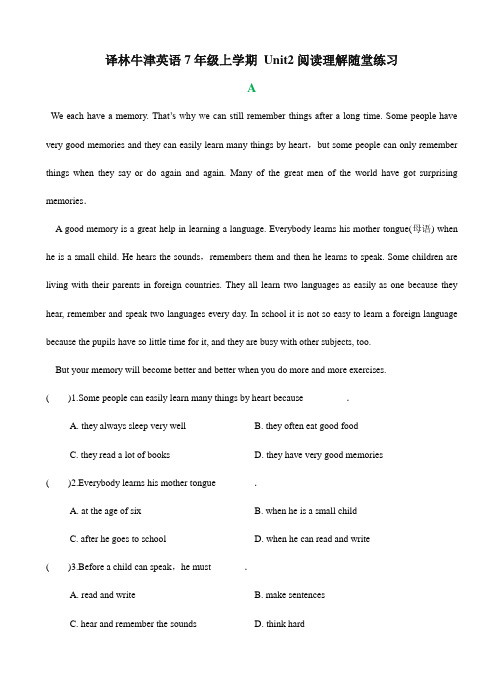
译林牛津英语7年级上学期Unit2阅读理解随堂练习AWe each have a memory. That’s why we can still remember things after a long time. Some people have very good memories and they can easily learn many things by heart,but some people can only remember things when they say or do again and again. Many of the great men of the world have got surprising memories.A good memory is a great help in learning a language. Everybody learns his mother tongue(母语) when he is a small child. He hears the sounds,remembers them and then he learns to speak. Some children are living with their parents in foreign countries. They all learn two languages as easily as one because they hear, remember and speak two languages every day. In school it is not so easy to learn a foreign language because the pupils have so little time for it, and they are busy with other subjects, too.But your memory will become better and better when you do more and more exercises.( )1.Some people can easily learn many things by heart because_________.A. they always sleep very wellB. they often eat good foodC. they read a lot of booksD. they have very good memories( )2.Everybody learns his mother tongue________.A. at the age of sixB. when he is a small childC. after he goes to schoolD. when he can read and write( )3.Before a child can speak,he must_______.A. read and writeB. make sentencesC. hear and remember the soundsD. think hard( )4.In school the pupils can’t learn a foreign language well because________.A. they have no good memoriesB. they have no recordersC. they have too much time for itD. they are busy with other subjects( )5.Your memory will become better and better_________.A. if you have plenty of good foodB. if you do more and more exercisesC. if you do morning exercises every dayD. if you get up earlyBKing’s College Summer School is an annual (每年的) training programme for all the middle school students who want to improve their English. Courses are given by the teachers of King’s College and other colleges in New York. Trips to museums and culture centres are also organized.This year’s summer school will be from Ju ly 25 to August 15. More information is as follows:1. You can most probably read the material in ______ .A. a newspaperB. a travel guideC. a textbookD. a telephone book2. According to the material, who will give the courses?A. The teachers of King’s College and the middle schools in AmericaB. The teachers of King’s College and other colleges in the United StatesC. The teachers of the middle schools and King’s College in New York.D. The teachers of King’s College and other colleges in New York.3. When should foreign students send their applications?A. Before April 10, 2019.B. Before June 1, 2019.C. Before April 16, 2019.D. Before July 15, 2019.4. If you want to live with your friends in New York, you will have to pay the school ______ .A. $300B. $400C. $500D. $9005. Which of the following is TRUE about King’s College Summer School?A. Only top students can take part in the programme.B. Visits to museums and culture centres are part of the programme.C. King’s College Summer School is not organized every year.D. You can get in touch with the school by telephone or by email.COne day, Tom's teacher, Miss Mak, held a class meeting. "There will be a flag day next Saturday. Does anyone want to join this meaningful event (活动) ?" asked Miss Mak. Tom was interested in raising money for homeless children, but he was not brave enough to talk to the strangers, so he kept quiet in his seat."Tom, you haven't sold flags before," said Miss Mak suddenly. "Would you like to have a try?" Tom was hesitant (犹豫的) , but he finally nodded.On the flag day, Tom and Angela sold flags in a busy street. "Excuse me. Could you please buy…?" said Angela softly to the first person she met. The man smiled and put a five-dollar coin into Angela's collection bag. Then she said thanks and put a flag under his shoulder. "I did it!" said Angela happily. "It's your turn now."Feeling nervous, Tom began to shake. Soon, he saw a young lady walking towards him. The lady was smiling and holding a few coins in her hand. She asked, "Are you selling flags for Fund for the Homeless Children?" Tom's face became red and said yes. Then the lady made the donation (捐赠) and Tom gave her a flag."You made it!" laughed Angela.In the next couple of hours, Angela and Tom sold flags quickly and bravely. At last, their collection bags were so heavy that they had to hold them with both arms. They felt very proud.1.Why did Tom keep quiet in his seat?A. He had other plans.B. He didn't like Miss Mak.C. He was not interested in the activity.D. He was not brave enough to talk to the strangers.2.When Miss Mak asked Tom to have a try, he finally ______ .A. laughedB. noddedC. refusedD. cried3.Where did Tom and Angel sell lags?A. In a busy street.B. In their school.C. In a tall building.D. In a small garden.4. How much did the first man pay Angel for the flag?A. Five dollars.B. Ten dollars.C. Fifteen dollarsD. Twenty dollars.5.How did Tom and Angela feel after they sold the flags?A. Bored.B. Shy.C. Confident.D. Sad.DWhat does a typical day look like for a high school student in the United States? Well, everyone's is very different. I can describe my normal day in high school for you.Our school day usually went from 8:30 a.m. to 5:30 p.m. However, some days I had cheerleading (啦啦队) practice or play practice at 6:30 a.m. If I had cheerleading practice I got ready at school, and if I had time, I ate breakfast at the school dining hallThen I would go towards my locker and get my books for the first period. Each class went for about 50 minutes and we had 4 minutes to get to the next class. We studied everything from Science to Maths and Spanish to P.E.I played the flute (长笛) in band, so one of my class periods was used for that. Lunchtime would be at 12:30 p.m. and then we had some time to hang out (闲逛) outside or by our lockers. At the end of the daythere was a seminar (研讨会) period. It could be used for studying or meetings.After school, I would cheer at a basketball game, be a lifeguard (救生员) at work or have speech practice. My family always tried to have dinner together at around 7 p.m., but there wasn't always enough time. I would finally start studying at around 8 or 9 p.m.So there you have it! That's my typical day in high school.1.How long did the writer usually stay at school on his school day?A. Seven hours.B. Eight hours.C. Nine hours.D. Ten hours.2.Where did the writer cat breakfast if he had time?A. At school.B. At home.C. In a restaurant.D. In the park.3.When did the writer hang out with his classmates?A. After the first class.B. After lunch.C. After breakfast.D. After the park.4.Which of the following is NOT the writer's afterschool activity?A. Have meetings.B. Cheer at a game.C. Be a lifeguard.D. Practise speech.5.What does the passage mainly talk about?A. Our school day.B. Everyone's life is different.C. The after-school life in the USA.D. A typical day in high school in the USA.EAll schools have their own rules. The rules change from one school to another. Some schools are much stricter than others. There are also some rules that are strange or funny to us. Here are some funny school rules:Strict Japanese rulesMost schools ask students to wear uniforms, such as sports suits or skirts. But Japanese schools even have rules about the colour of the underwear! They also require that girls’ socks should be folded (被折叠) in a certain way and that boys’ heads should be sha ved (剃) .Other Japanese schools tell students that they can’t watch the films after sunset.Different shoes in the USAAt some American schools, students have to change their shoes when they go into the schools every day. This makes sure that student s won’t fall over on the floors and will keep the schools clean.No strange hair in the UKStrange hairstyles are not allowed in some British schools. But they may allow students to wear certain hairstyles during the World Cup years. After the World Cup, their teachers will ask them to go to the barber’s at once.1. How many strange or funny school rules are mentioned in this passage?A. Three.B. Four.C. Five.D. Six2. Students in most Japanese schools should wear ______ .A. uniformsB. indoor shoesC. shirtsD. strange hairstyles3. Why do students in some American schools have to wear indoor shoes?A. Because in that way they won’t get hurt if they fight.B. Because in that way they will feel comfortable.C. Because in that way they won’t fall over and can keep the schools clean.D. Because in that way they won’t make any noise when walking.4. Which country’s schools have rules about students’ hair?A. Schools in Japan only.B. Schools in the USA and the UK.C. Schools in Japan and the UK.D. Schools in the UK only.5. What’s the best title for the passage?A. Different school uniformsB. Different hairstylesC. Different shoesD. Different school rulesFMusic is all around. In just twelve minutes, the game is over. But a new one starts right away (立刻). How exciting!This is streetball. It's much like basketball. But it's faster. People play it outside and it's interesting. Usually, children play street ball on an open (露天的) court. They use only half of the court. What they need is a basketball goal (球框). Children love lots of things about the game."It's very nice to be outside in the sun. And the music is great", said Bai Xue, fourteen, a girl in Shenyang.Some say street ball was from Europe (欧洲), others say it came from America. But now, boys and girls in many countries like to play it. Street ball is a game for all.1. How many players are there in each streetball team?A. 1B. 2C. 3D. 42. Streetball is much like _________.A. basketballB. tennisC. footballD. badminton3. Which one is NOT right?A. The game is over in twelve minutes.B. People usually play a streetball outside.C. Only girls like to play the game.D. They use only half of the court.4. Where was the game from?A. Europe.B. America.C. China.D. A or B.5. What's the best title (题目) of this passage?A. Different Ball GamesB. Streetball: An Exciting GameC. How to Play StreetballD. Streetball And Basketball。
unit2a-different-school教案

7 From this year on, our lessons are getting more and more interesting
Step 5: Post-reading activities
更新、补
充、删节
内容
课外作业
Writing a passage
教学后记
授课板书设计
Unit 2 A Different School
1 Look at the map in the book; choose the correct word for each picture
Garden花园Classroom building教学楼
Step 2Readingcomprehension
Activity1. Scan the passage and answer the questions:
Who likes his/her new school?
How do you know?
Activity2: read the passage again and match the students with what they’re talking about.
教学重点
1.To train the students’ reading skills.
2.Understand the key points of speaker through listening.
教学难点Байду номын сангаас
How to improve the students’ reading and writing abilities.
七年级上册英语Unit2知识点归纳总结
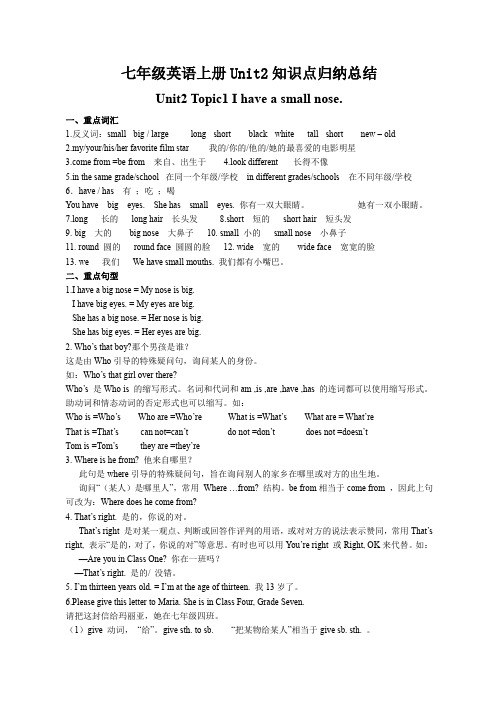
七年级英语上册Unit2知识点归纳总结Unit2 Topic1 I have a small nose.一、重点词汇1.反义词:small - big / large long - short black - white tall - short new – old2.my/your/his/her favorite film star我的/你的/他的/她的最喜爱的电影明星e from =be from来自、出生于4.look different长得不像5.in the same grade/school在同一个年级/学校in different grades/schools在不同年级/学校6.have / has 有;吃;喝You have big eyes. She has small eyes. 你有一双大眼睛。
她有一双小眼睛。
7.long 长的long hair 长头发8.short 短的short hair 短头发9. big 大的big nose 大鼻子10. small 小的small nose 小鼻子11. round 圆的round face 圆圆的脸12. wide 宽的wide face 宽宽的脸13. we 我们We have small mouths. 我们都有小嘴巴。
二、重点句型1.I have a big nose = My nose is big.I have big eyes. = My eyes are big.She has a big nose. = Her nose is big.She has big eyes. = Her eyes are big.2. Who’s that boy?那个男孩是谁?这是由Who引导的特殊疑问句,询问某人的身份。
如:Who’s that girl over there?Who’s 是Who is 的缩写形式。
名词和代词和am ,is ,are ,have ,has 的连词都可以使用缩写形式。
Unit-2-a-different-school
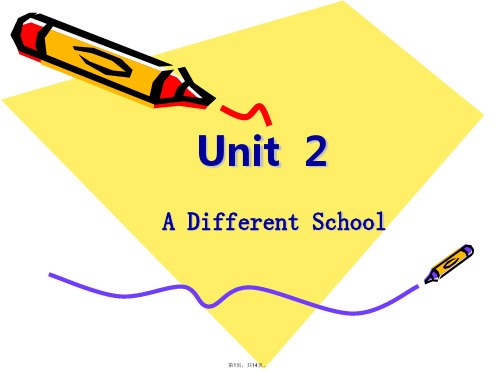
3. Can you believe it ? I’m a memberof the comic club now!
4. Excuse me, do you know the way to this
ho?tel
5. My classmate are all friendlyto me.
6. It is cold outside, but he feels very warm in his
48、、IIt’ts’s etlehvreenetow’cenlotyc-ktwino itnhtehme aofrtnerinnogon ininTTookkyyoo..
Telling time
7:00 It’s seven o’clock. It’s seven p.m./ a.m.
(24小时制中的0:01—11:59换算成12小时制就用a.m.作后缀
.
heart
7. The
at this restaurant is good ,but the food is just OK.
service
8. You want to be a doctor? Here’s a
.
chance
第7页,共14页。
Speaking P16
Sandy: Excuse me. Do you know the way to the training center?
Example: A: Where do you have English lessons? B: I have English lessons
in the classroom building.
A: Where do you have cooking lessons? B: I have cooking lessons A: Winhtheeretrdaoinyinogu cpelanytefro.otball? BA:: IWphlaeyrefodootbyaollu ignothfoer plulanycghr?ound . BA:: IWghoefroer dluonycohu ibnotrhreowdinbionogksh?all . BA:: IWbhoerrroewdoboyookusslienetph?e library . B: I sleep in the dorm .
七年级上 Unit 2 单元综合能力检测题(含答案)
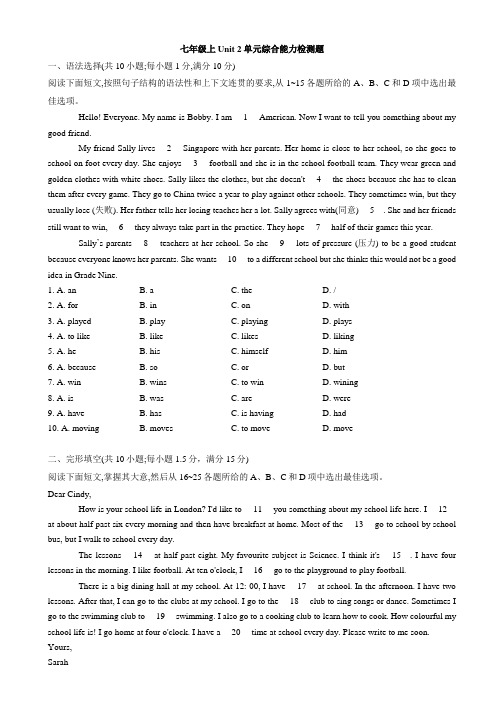
七年级上 Unit 2 单元综合能力检测题一、语法选择(共10小题;每小题1分,满分10分)阅读下面短文,按照句子结构的语法性和上下文连贯的要求,从1~15各题所给的A、B、C和D项中选出最佳选项。
Hello! Everyone. My name is Bobby. I am __1__ American. Now I want to tell you something about my good friend.My friend Sally lives __2__ Singapore with her parents. Her home is close to her school, so she goes to school on foot every day. She enjoys __3__ football and she is in the school football team. They wear green and golden clothes with white shoes. Sally likes the clothes, but she doesn't __4__ the shoes because she has to clean them after every game. They go to China twice a year to play against other schools. They sometimes win, but they usually lose (失败). Her father tells her losing teaches her a lot. Sally agrees with(同意) __5__. She and her friends still want to win, __6__ they always take part in the practice. They hope __7__ half of their games this year.Sally’s parents __8__ teachers at her school. So she __9__ lots of pressure (压力) to be a good student because everyone knows her parents. She wants __10__ to a different school but she thinks this would not be a good idea in Grade Nine.1. A. an B. a C. the D. /2. A. for B. in C. on D. with3. A. played B. play C. playing D. plays4. A. to like B. like C. likes D. liking5. A. he B. his C. himself D. him6. A. because B. so C. or D. but7. A. win B. wins C. to win D. wining8. A. is B. was C. are D. were9. A. have B. has C. is having D. had10. A. moving B. moves C. to move D. move二、完形填空(共10小题;每小题1.5分,满分15分)阅读下面短文,掌握其大意,然后从16~25各题所给的A、B、C和D项中选出最佳选项。
Unit 2 A different school教学设计

学科英语授课年级高中一年级二班学校苏州丝绸中专教师姓名林芳
章节名称
计划学时1教学目标 Nhomakorabea1.Knowledge aims
Master some phrasesand wordsaboutschool life
2.Ability aims
Students can talk about their courses and activities at school.
巩固学生所学的词汇和句型。
Step5
Summary &Homework
2
1.Summarize what we learn in this class.
2.Practice the dialogue you have made after class.
3.Exercise on students workbook(P16-17, P20).
听力内容很简单,主要让学生掌握一些简单的表达认可和否定的表达方式。
Step3
Listening
(B)
15
1.Match the pictures with the subjects.
2.Listen and circle the best answer.
(Where does Jason work? )
3.Emotion aims
Encourage students toexpress their opinions about their school life.
教学重点
phrases andwords about school life.
教学难点
How to express their lifein Englishand speak loudly.
江苏高邮中专英语(Book1 苏教版)教案:Unit2 A Different School 02
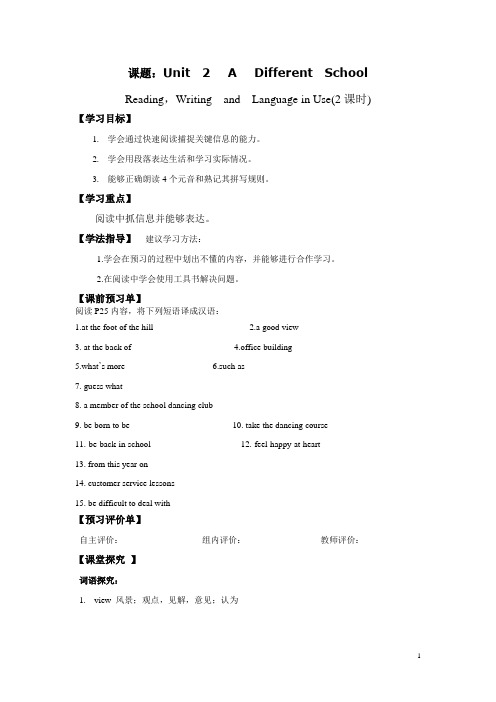
课题:Unit 2 A Different SchoolReading,Writing and Language in Use(2课时)【学习目标】1.学会通过快速阅读捕捉关键信息的能力。
2.学会用段落表达生活和学习实际情况。
3.能够正确朗读4个元音和熟记其拼写规则。
【学习重点】阅读中抓信息并能够表达。
【学法指导】建议学习方法:1.学会在预习的过程中划出不懂的内容,并能够进行合作学习。
2.在阅读中学会使用工具书解决问题。
【课前预习单】阅读P25内容,将下列短语译成汉语:1.at the foot of the hill______________________2.a good view___________________3. at the back of _______________________4.office building _______________________5.what’s more____________________6.such as_____________________7. guess what_______________________8. a member of the school dancing club___________________________9. be born to be _______________________10. take the dancing course ____________________ 11. be back in school____________________ 12. feel happy at heart_______________________13. from this year on___________________________14. customer service lessons_________________________15. be difficult to deal with ______________________________【预习评价单】自主评价:_______________ 组内评价:_________________ 教师评价:______________ 【课堂探究】词语探究:1.view 风景;观点,见解,意见;认为scene 也可以指风景,但view 强调从高处或远处看到的风景;scene 指具体的或一时的景色(自然或人为的)例句:1)There is a view of the river from my window. 在我的窗前可以看到河上的风光。
人教版高中英语选择性必修第三册精品课件 Unit 2 Section A 分层跟踪检测
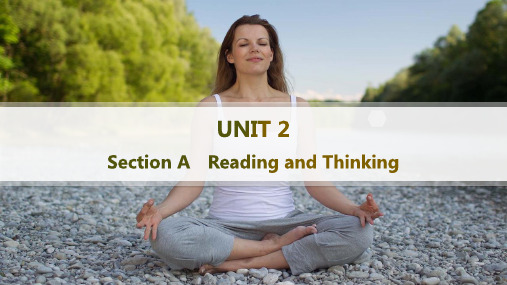
ⅠⅡⅢⅣⅤⅥ
2.How did the researchers draw a conclusion from the study? C A.By comparing earlier work. B.By asking and answering questions. C.By conducting experiments. D.By analyzing the data from scientific texts.
ⅠⅡⅢⅣⅤⅥ
ห้องสมุดไป่ตู้
Earlier work has linked exposure to light during sleep to an increased risk of obesity(肥胖) in women.Zee recommends,“Make sure that you start dimming your lights at least an hour or two before you go to bed to prepare your environment for sleep.” 【语篇导读】本文是一篇说明文。文章主要讲述了睡觉时昏暗的灯光对 人体的健康会产生一定的危害。
ⅠⅡⅢⅣⅤⅥ
In the study published in Sciences on Monday,scientists asked 20 participants aged 19 to 36 to spend two nights in their lab.On the first night of sleep,the volunteers slept in a very dark room.For their second night of sleep,half of the group slept with streetlights through a window,and half spent their second night in a dark room.
新牛津深圳版英语七年级下册第2单元知识要点

新牛津深圳版英语七年级下册第2单元知识要点Unit 2: At School本单元以“At School”为主题,主要介绍了在学校的常见场景和相关词汇、句型以及日常对话。
1. Vocabulary(词汇)本单元的词汇主要涵盖以下方面:- Places at school: classroom(教室)、library(图书馆)、computer room(计算机室)、science lab(实验室)等;- Subjects: math(数学)、English(英语)、Chinese(汉语)、science(科学)等;- School facilities: whiteboard(白板)、computer(计算机)、projector(投影仪)等;- School activities: sing a song(唱歌)、play basketball(打篮球)、do experiments(做实验)等。
2. Sentence Patterns(句型)在本单元中,我们学习了一些常用的句型,用于描述在学校的活动和交流。
- What's your favorite subject?(你最喜欢的科目是什么?)- My favorite subject is...(我的最喜欢的科目是...)- What do you do at school?(你在学校做什么?)- I study English, math, and science.(我学英语、数学和科学。
)- Let's go to the computer room.(让我们去计算机室。
)- What are you doing?(你在做什么?)- I'm playing basketball.(我在打篮球。
)3. Dialogues(对话)本单元的对话主要涵盖了在学校的常见日常交流情景。
Dialogue 1: Talking about favorite subjectsA: What's your favorite subject?B: My favorite subject is English. What about you?A: I like math the most.B: That's interesting.Dialogue 2: Making plansA: What do you do at school?B: I study different subjects. How about you?A: I study English, math, and science. Let's go to the library after class. B: Sure, that sounds like a good idea.4. Culture Corner(文化角落)本单元的文化角落部分主要介绍了英语国家和中国学校文化的一些差异。
江苏高邮中专英语(Book1 苏教版)教案:Unit2 A Different School 03
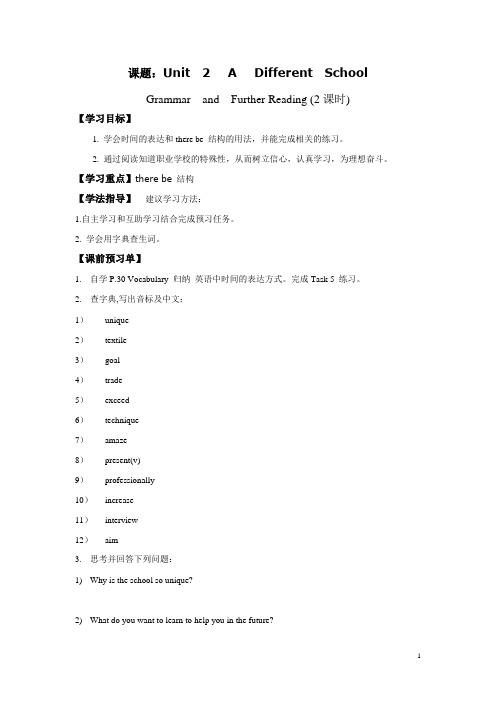
课题:Unit 2 A Different SchoolGrammar and Further Reading (2课时)【学习目标】1. 学会时间的表达和there be 结构的用法,并能完成相关的练习。
2. 通过阅读知道职业学校的特殊性,从而树立信心,认真学习,为理想奋斗。
【学习重点】there be 结构【学法指导】建议学习方法:1.自主学习和互助学习结合完成预习任务。
2. 学会用字典查生词。
【课前预习单】1.自学P.30 Vocabulary 归纳英语中时间的表达方式。
完成Task 5 练习。
2.查字典,写出音标及中文:1)unique2)textile3)goal4)trade5)exceed6)technique7)amaze8)present(v)9)professionally10)increase11)interview12)aim3.思考并回答下列问题:1)Why is the school so unique?2)What do you want to learn to help you in the future?【预习评价单】自主评价:_______________ 组内评价:_________________ 教师评价:______________ 【课堂探究】语法专车There is/There are with some and anyThere be 是英语中常用句型,意思是“有”,表示“人或事物的存在”。
要表达“某个地方或某个时间存在什么事物或人”的时候常用“There be + 名词+ 地点(时间)这一句型。
例如:There is a great Italian deli across the street. 穿过街道,有一家大的意大利熟食店。
注意:1、There be 句型中的be 应和其后出现的主语在数上一致,即“___________原则”,如:1)There is a lamp on the table. 桌上有一盏灯。
Unit2 A different school读
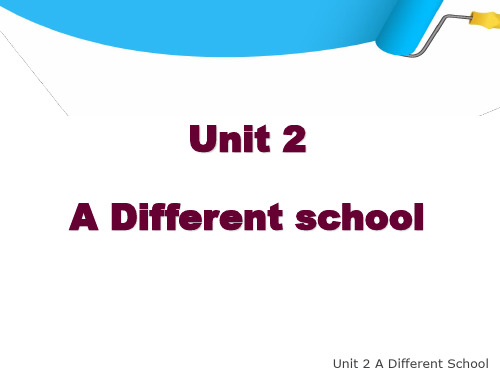
Unit 2 A Different School
take a chance
得到机会
把握机会
Unit 2 A Different School
Step 4 Practice
Read the passage again and tick(√)the typical description of a vocational school.
My school is that at the foot of a hill.
Unit 2 A Different School
Step 3
Language study
7.My mum always says I was born to be a good dancer.
8.Now, I’ve got the chance and I’m taking the dancing course. get a chance
Unit 2 A Different School
Billy’s school
Where is Billy’s school? Is it a very big school? How many building are there in his
school?
Unit 2 A Different School
Unit 2 A Different Schdy
For example
E g:
1.Many people here, for example, John, would rather have coffee.
2.There are many kinds of pollution, for example, noise is a kind of pollution.
Unit_2_reading_How_do_you_like_your_new_school
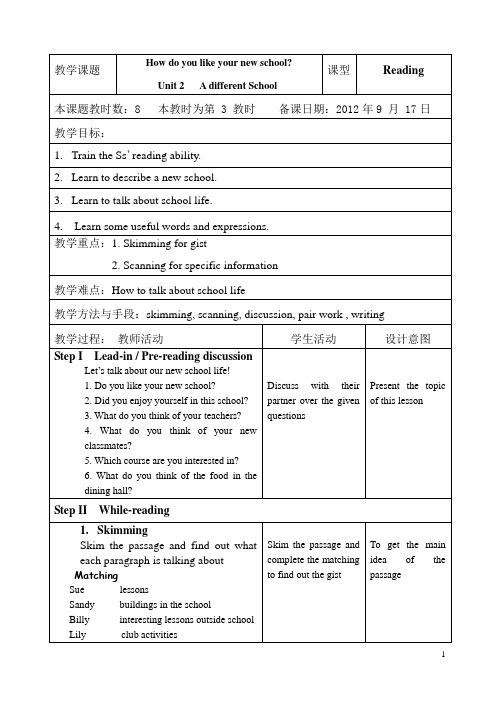
•Where is Billy’s school?
•Is it a very big school?
•How many buildings are there in his school?
•Where is the training center?
Sue’s school life
Lilyclub activities
Skim the passage and complete the matching to find out the gist
To get the main idea of the passage
2.Scanning
scan each paragraph and find out the answers to the questions
My school is at the foot ofa hill.
There is a training center at the back of the school.
Sometimes we study in the classroom, and sometimes in the training center.
Scan each paragraph to find out specific information
To get detailed information of each paragraph
3.Multiple choice
Find out the typical descriptions of a vocational school
Homework
1. Read the passage after class by yourself to get a better understanding
二年级下英语教案-Unit 2 At school_深港朗文版
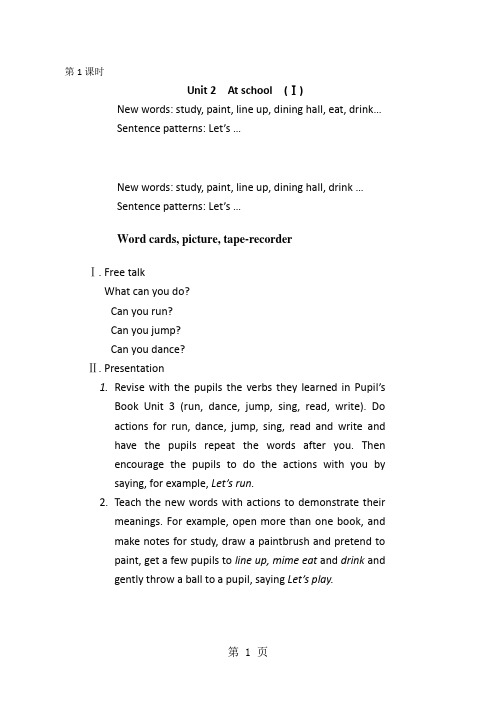
第1课时Unit 2 At school (Ⅰ)New words: study, paint, line up, dining hall, eat, drink…Sentence patterns: Let’s …New words: study, paint, line up, dining hall, drink …Sentence patterns: Let’s …Word cards, picture, tape-recorderⅠ. Free talkWhat can you do?Can you run?Can you jump?Can you dance?Ⅱ. Presentation1.Revise with the pupils the verbs they learned in Pupil’sBook Unit 3 (run, dance, jump, sing, read, write). Doactions for run, dance, jump, sing, read and write andhave the pupils repeat the words after you. Thenencourage the pupils to do the actions with you bysaying, for example, Let’s run.2.Teach the new words with actions to demonstrate theirmeanings. For example, open more than one book, andmake notes for study, draw a paintbrush and pretend topaint, get a few pupils to line up, mime eat and drink andgently throw a ball to a pupil, saying Let’s play.3.Drill the new words by saying a word and getting thepupils to do the appropriate action or by doing an action and getting the pupils to say Let’s …4.Show Transparency and play the tape. Ask the pupils torepeat the words in the speech bubbles after the beeps.Do the same with the vocabulary items.Ⅲ. Practice1.Show Transparency. Point to the children on the pagewho are painting. Say Let’s paint. Get the pupils to do the action and join in with them. Let’s line up.2.Point to the other words. Ask the pupils to repeat themafter you and to do the action you have taught them. 3.Ask the pupils to work in groups of four. Give a word cuelike study.Nominate one pupil in the group to make a sentence with Let’s …and to invite Ss to do the action with him or her.1.Copybook 52.Workbook 63. Write the new words on the notebook. Unit 2 At schoolwords (picture cards) Let’s study. Let’s paint. Let’s line up.The activity that teacher give orders (say the words) and pupils do actions is good for memorizing the new words and sentence pattern.第2课时Unit 2 At school (Ⅱ)New words: sing, play, study …Sentence patterns: What do you do in the …? We … and …New words: sing, play, study …Sentence patterns: What do you do in the …? We … andWord cards, picture, tape-recorderⅠ. GreetingHow are you today?Is there a library in the school?Can we shout in the library?Ⅱ. Presentation1.Bring in the plan of the school again.2.Point to an appropriate room on the plan. Make sentences aboutwhat the pupils do in the room. For example, say We study in the classroom.3.Drill the pupils by asking about the different rooms, e.g. What do youdo in the dining hall?Encourage the more able pupils to use more than one verb by saying And? With rising intonation after they have told you one thing they do, e.g. S: We eat. T: And? S: We drink.4.Show Transparency and play the tape. Point to the speech bubblesand get the pupils to repeat the sentences after the beeps.Ⅲ. Practice1.Show Transparency and play the tape. The pupils listen and follow intheir books. Continue to play the cassette and ask the pupils to repeat the words after the beeps.2.Show Ss the characters and explain Mike is in Pat’s school.3.Point to the pictures and ask, for example, what do you do in theplayground? Encourage the pupils to make a sentence about each small picture in the thought bubbles.4.Show the pupils, using the sentences in the speech bubbles, thatwhen we talk about more than one thing we can use … and … to link the actions. We can also use …, too to link a sentence to a previous sentence.5.Point to Pat’s thought bubbles in picture 3. help Ss to link the actionsshown by saying … and … or …, too.6.Ask the pupils to work in pairs to complete the conversation. Thepupils take turns to role-play P and M.1.Copybook 62.Workbook 73. Review what welearned today.Unit 2 At school What do you do in the playground? We line up and sing.We play, too.Enlargement:1.We surf the internet/ play computer game in the computer room.2.We sing and dance/ have a show in the hall.3.We swim in the swimming pool.jump, run, read, write, etc.第3课时Unit 2 At school (Ⅲ)Words: here ,pool, coolSentence patterns “What do you do in the …?”“We …and …”“We play in the …”the sentence patterns of “ What do you do in the …?”the sentence patterns of “ What do you do in the …?”Picture cards, tape-recorderⅠ. GreetingWhat do you do at home?We eat and drink.We play, too.Ⅱ. Presentation1.Point to the characters in the pictures and read their speechbubbles aloud. Ask the pupils to point to the speech bubbles as you read them.2.Play the Pupil’s Book Cassette for the pupils and ask them to saythe sentences after the cassette.3.Pupils say the speech bubbles together. And then say them groupby group, see which group is best.4.Ask the pupils to role-play the story in groups of three and to readthe characters’ speech bubbles. Some groups may like to come out to the front and act the story.e the storycards to revise sequence and language of the story.Ⅲ.Do the part D1.Ask the pupils to read the story again. Read the words in thespeech bubble with pupils and tell them to repeat the sentences.2.Demonstrate how to write a cross in the first one as an example.e Transparency to check the answers.Ⅳ. More to do1.Write the names of the different rooms on the board. Using stripsof paper with the action verbs written on them, ask the pupils to stick a strip of paper under an appropriate room name.2.Ask a pupil about a room, for example, what do you do in themusic room? The pupil makes a sentence using the word on the strip of paper under the room name. This game can also be played in teams for points.1.Copybook 72.Workbook 83. Review what welearned today.Unit 2 At schoolWe fly in here.We read in the swimming pool. Your school’s cool.Role-playing and acting out the story gain a good effect.Retelling the story with the help of teacher help pupils understand the story.第4课时Unit 2 At school (Ⅳ)The pronunciation of “ea” in the following words: ice cream, seat,read, eatpronunciation ea in the words: ice cream, seat, read, eatpronunciation ea in the words: ice cream, seat, read, eatPicture cards, word cards, tape-recorderⅠ. GreetingWhat’s your favourite food?Do you like apple?Do you like ice cream?Ⅱ. Presentation1.Play the Pupil’s Book Cassette and ask the pupils to listen to thesound and the words.2.Point out the spelling of this sound. It is important that the pupilsrealize the vowel sound is spelt with two letters.3.Say the words slowly and clearly. Check that the pupils are sayingthe sounds correctly.4.Point to the pictures and check that the pupils to listen to therhyme and point to the children. Ask the pupils to read what is written on the wrappers of each child’s ice cream. Tell them to circle the winner. Get the pupils to say the rhyme.Ⅲ. Play the game1.Write the names of the different rooms on the board. Using stripsof paper with the action verbs written on them, ask the pupils to stick a strip of paper under an appropriate room name.2.Ask a pupil about a room, for example, What do you do in themusic room? The pupil makes a sentence using the word on the strip of paper under the room name. This game can also be played in teams for points.Ⅳ. Do workbook.(P9)1.Ask Ss to look at the first part of the page and listen to the tape.They need to circle the correct TVs according to the sound theyhear on the tape.2.Ask the pupils to look at the second part of the page. Tell them tolook at the pictures and fill in the blanks in the sentences.1.Copybook 82.Workbook 93. Review what welearned today.Unit 2 At school What do you do in the playground? We line up and sing.What do you do in the music room? We sing and dance.第5课时Unit 2 At school (Ⅴ)Get pupils to be more familiar with the words and thesentence patterns “ What do you do in the …?”“We …and …”…words and the sentence patterns “ What do you do …?”words and the sentence patterns “ What do you do …?”word cards, pictures and tape-recorderⅠ. Free talkWhat do you do in the playground?I play…What do you do in the classroom?I study………Ⅱ. Word revisionReview the words. Ask some pupils do actions for study, paint, line up, eat, drink…the others guess the wordsand spell the words.Choose some students to spell the words, and choose some able students, make sentences with words.Ⅲ. Presentation ( F. Look and do. P.11)1.Ask the pupils to draw their own face in the blank faceson page 62. Tell them to cut out the pictures and to stick them in the four rooms at the top of page 11. Tell them not to show their friend.2.Tell the pupils to work in pairs. Ask them to take turns toask What do you do in the …? The other pupil answers according to the picture he or she has put in that room.The pupil asking the questions ticks the correct boxes in the grid at the bottom according to their partner’s answer.3.At the end, the pupils check to see if their pictures andtheir partner’s grid match.Ⅳ. More to doThe pupils draw a picture of their favorite room in the school. They write a caption to tell what they do there.Ⅴ. SummaryWhat do you do in the library?I study.What do you do in the dining hall?We eat and drink.What do you do in the …?1.Workbook 102.Review the words3.Review what we learned today.Unit 2 At schoolWhat do you do in the library?I study.What do you do in the dining hall? We eat and drink.第6课时Unit 2 At school (Ⅵ)Consolidate all the new words and sentence patterns of Unit 2Sing the songsNew words and sentence patternsSentence patternsWord cards, picture cards, tape-recorderⅠ. GreetingWhat do you do in the home?I do my homework.I eat and drink. I play, too.Ⅱ. Revision1.Review the new wordsstudy, paint, line up, dining hall, eat, drink, do, weat school, well2. Review sentence patterns.What do you do in the playground?We line up and sing. We play, too.What do you do in the classroom?We study.What do you do in the dining hall?We eat and drink.What do you do in the art room?We paint and draw.Ⅲ. Sing and play1.Play the Pupil’s Book Cassette for the pupils to listen tothe song. Ask the pupils What do you do in the …? For each of the rooms listed at the bottom of the page.2.Play the cassette again and tell the pupils to point to thecorrect pictures for each of the verses.3.Play the cassette again and encourage the pupils to joinin with the words.Ⅳ. The pupils play a miming game.Give a pupil a strip of paper with a verb from this unit written on it. The pupil reads the word on the strip of paper silently and then mimes the action. The others guess what action he or she is doing by making a sentence like We sing in the music room. Award points for correct guesses.Ⅴ. Summary1.Review theunit.2.Recite PartAand PartB3.Prepare Unit3。
第2单元的英语作文 五年级
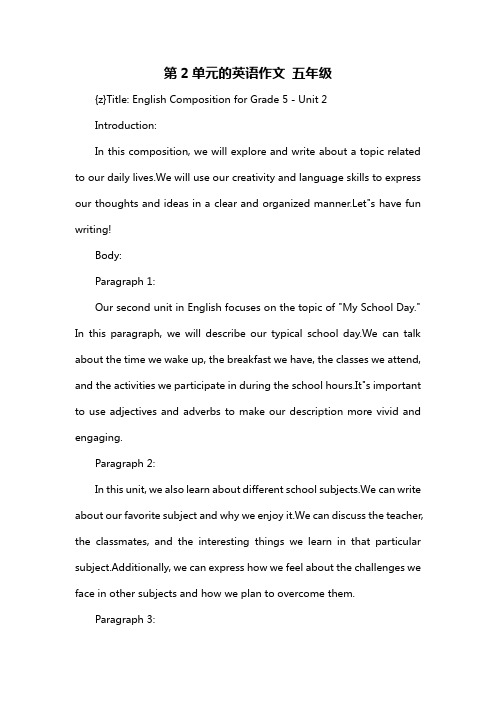
第2单元的英语作文五年级{z}Title: English Composition for Grade 5 - Unit 2Introduction:In this composition, we will explore and write about a topic related to our daily lives.We will use our creativity and language skills to express our thoughts and ideas in a clear and organized manner.Let"s have fun writing!Body:Paragraph 1:Our second unit in English focuses on the topic of "My School Day." In this paragraph, we will describe our typical school day.We can talk about the time we wake up, the breakfast we have, the classes we attend, and the activities we participate in during the school hours.It"s important to use adjectives and adverbs to make our description more vivid and engaging.Paragraph 2:In this unit, we also learn about different school subjects.We can write about our favorite subject and why we enjoy it.We can discuss the teacher, the classmates, and the interesting things we learn in that particular subject.Additionally, we can express how we feel about the challenges we face in other subjects and how we plan to overcome them.Paragraph 3:Another important aspect of our school life is extracurricular activities.In this paragraph, we can write about the clubs or sports teams we are involved in.We can describe the activities we do, the skills we learn, and the friends we make during these extracurricular activities.It"s essential to highlight the benefits of participating in these activities, such as improved physical fitness, teamwork, and time management skills.Paragraph 4:Lastly, we can reflect on what we have learned in the second unit and how it has helped us grow as students.We can discuss the importance of a balanced school day, including academics, physical activities, and social interactions.We can also share our goals for the upcoming units and how we plan to achieve them.Conclusion:In conclusion, the second unit of our English composition focuses on different aspects of our school life.By describing our typical school day, discussing our favorite subject, highlighting extracurricular activities, and reflecting on our learning progress, we can showcase our creativity and language skills.Writing this composition will not only help us improve our writing abilities but also enable us to express our thoughts and ideas effectively.Let"s enjoy this writing journey and excel in our English learning!ote: This is a sample composition for Grade 5 students based on thegiven task title.Adjustments can be made according to the specific requirements and curriculum of the students.。
